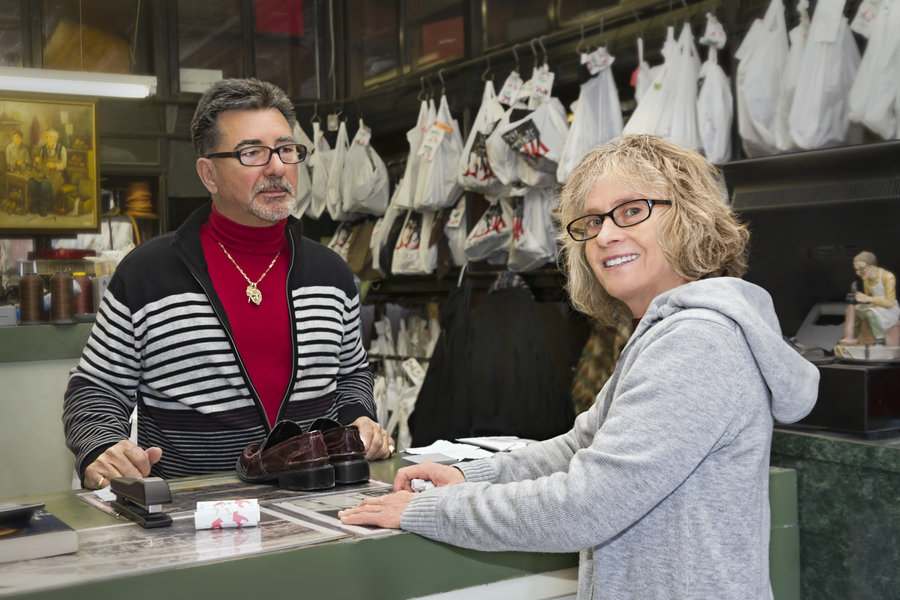So, I buy this cool-looking pair of retro penny loafers. The problem? The leather is so stiff that a year later, I still haven’t been able to break them in. I’m no Emelda Marcos, so when I have a shoe problem, I can’t just open the closet. This is a job for Giovanni Perrupato of Giovanni D’Italia, a shoemaker who has been in Hoboken for more than 50 years, first at 700 Garden St. and then at 266 Seventh.
The place is bustling. Bags of shoes hang from hooks along the walls. There’s a work room in the back, and Giovanni is up front on the phone.
I ask him if he can distress my shoes, bang them up, make them look like they’d been worn in the Battle of the Bulge. What’s great about Giovanni is that he doesn’t pull his punches. He’s honest. He tells it like it is.
“No,” he says.
Seeing my distress, he explains, “It’s the leather. It can’t be done.”
What he means is that this is not a nice, soft Italian leather. In fact, the shoes look more like plastic. They’re shiny. You can see your reflection in them.
He does, however, agree to stretch them and asks me to come back in two days.
Giovanni, 69, was born in Cuba to a Cuban mother and Italian father. His mother died when he was 3. He was raised by a couple from Italy who came from the same hometown as his father, Saracena.
At age 15, in 1960, Giovanni’s father, Vincent, moved to Hoboken and brought Giovanni back from Italy. Vincent had been a shoemaker in Cuba, and they decided to open a store in Hoboken. They lived at 628 Garden in a $50-a-month apartment. “We couldn’t even make the rent,” Giovanni says.
They needed to augment their earnings from the store with factory work. Giovanni’s father worked in the Tootsie Roll factory. “Everybody worked in the Tootsie Roll factory, Giovanni says.
Everybody except Giovanni. He worked in a coat factory. “I was a floor boy,” he says. “I did everything, bring the coats over here, bring to the presser, run around all day long. I hated it. In the summertime we were busy making heavy coats with no air conditioning. The heat, oh my gosh.”
Things were a lot different in Italy. “When I left Italy I was living like a king,” he says. “My grandparents, who lived near us, were retired farmers. You’d grow whatever you wanted to eat. Everybody was a farmer there.”
Giovanni worked in the store on weekends. “I liked the store better than the factory,” he says. “I learned from my father and enjoyed the work, making shoes. People in the neighborhood got to know me and came around to see me working. At that time Hoboken had 1,000 shoemakers and no dry cleaners. Now it’s all dry cleaners and no shoemakers.”
When I go back two days later to pick up my pathetic shoes, it’s pretty early on a Friday morning. Kenin, who is upfront, has my shoes, ready and waiting. Each shoe is jammed with an Inquisition-era rack-like contraption made of metal and distressed wood that is doing its job to stretch my shoes. I can tell just by looking that they are bigger. When I try them on, I can feel the difference. The cost for 24 hours of stretching is $10. Now it’s up to me to do my part. I wear them around the office all day. Giovanni got me started, and now I think I can go the distance breaking in my shoes.
Obviously, a cobbler’s work has changed in more than 50 years. “At that time, kids had no sneakers,” Giovanni says. “I remember when school opened, oh my gosh, we fixed kids’ shoes. It was a family town. You came here, you got married, you lived here, and raised your family here. Not like now.”
One thing hasn’t changed: Women still wear high heels, and those heels still need to be fixed, and Giovanni D’Italia fixes them. “That’s why I say we are King of the Heel,” he says. The cost for heel repair is between $8 and $18.
But they also fix “you name it,” Giovanni says, “bags, zippers, coats, suitcases.”
Currently, all the employees are men. “We could use a woman’s touch up front,” Giovanni says. The store’s biggest problem was that it was flooded by Hurricane Sandy. The shop had previously been a drug store, and many of the fine wooden drawers had rotted from the water. “We got completely destroyed,” Giovanni says. “The shoes and the machines were destroyed, but we fixed the store in three months.”
Giovanni hopes that one of his sons will take over the business. “But if you think I will leave, you are wrong,” he says. “I enjoy it. I will be here forever.”—Kate Rounds
Giovanni D’Italia
266 7th St.
(201) 420-1639
